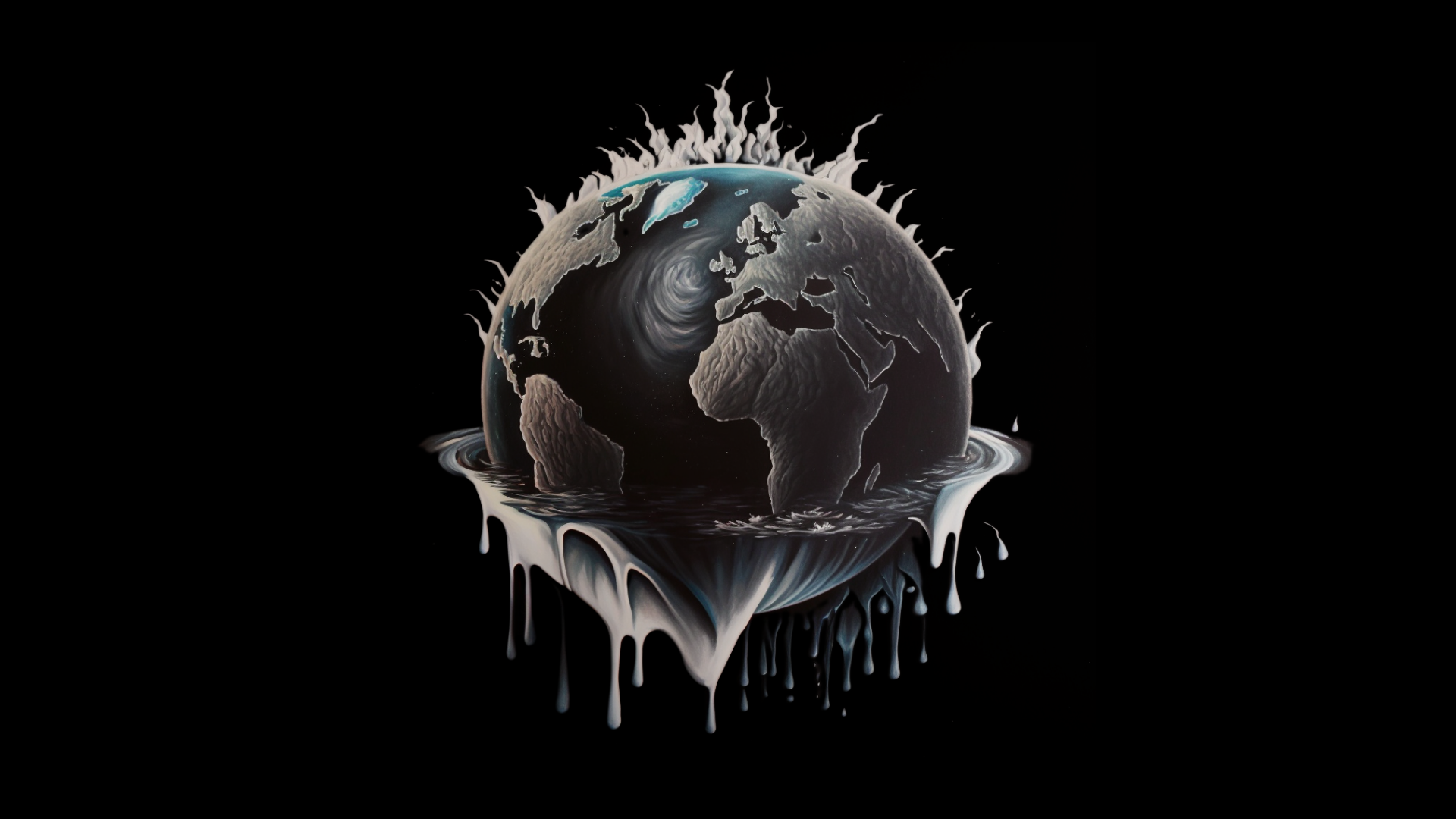
In turn, we use cookies to measure and obtain statistical data about the navigation of the users. You can configure and accept the use of the cookies, and modify your consent options, at any time.

Survivalist Futures
Illustration: Midjourney AI
Resilience, Relinquishment, Restoration, and Reconciliation. These are the four central values of an international social movement that is emerging in these years. The key imperative of this movement is founded on the diagnosis that anthropogenic climate change has by now already moved us beyond a set of tipping points that will make it impossible for future generations to avoid grand scale disasters and hence must prepare for the possibility of societal collapses.
This movement goes by the name Deep Adaptation. Its intellectual founder is the British geographer Jem Bendell who introduced the term in an academic paper published in 2018. The original paper was met with various forms of criticisms, including the contentions that it lacked scientific rigor or that it contained an unnecessary doomist framing. However, that has not stopped the paper from achieving immense popularity, which by this time of writing includes hundreds of thousand downloads.
There are probably two major reasons for this development. The first is that – whatever the merits of Bendell’s original paper – we are now approaching a critical junction where the danger of societal collapse does indeed seem to be a genuine possibility. In a recent review paper in Proceedings of the National Academy of Sciences (PNAS), an interdisciplinary group of prominent scientists give four key reasons to be concerned over the potential of a global climate collapse. Firstly, there are warnings from history in the sense that global or regional climate change has played a role in the collapse or transformation of numerous previous societies as well as in each of the five mass extinctions since the Cambrian explosion. The current rise in carbon emissions is already occurring at an unprecedented geological speed and IPCC worst-case scenarios – a so-called ‘RCP 8.5 scenario‘ – project temperatures by the end of the 22nd century that last prevailed back in the Early Eocene, 50 million years ago. Being evolved primarily during the last 2.5 million years, humanity itself (along with the rest of the biosphere) is adapted to a much cooler climate. Secondly, there is the distinct probability that climate change could directly trigger or exacerbate other catastrophic risks such as international conflict or infectious diseases. Thirdly, climate change may also exacerbate already existing vulnerabilities, in turn causing multiple indirect stresses (including water and food insecurity, loss of land, and economic damage) that may coalesce into system-wide synchronic failures. And fourthly, climate change could irrevocably undermine humanity’s ability to recover from another grand-scale cataclysm, such as nuclear war.

Broaden your horizons with a Futures Membership. Stay updated on key trends and developments through receiving quarterly issues of FARSIGHT, live Futures Seminars with futurists, training, and discounts on our courses.
become a futures memberThe second major reason is that investigating and preparing for bad-to-worst-case scenarios is a precondition for any reflected action taking in accordance with avoiding them. Elsewhere in the PNAS paper, the authors also note that the studies of bad-to-worst case climate scenarios are in general underreported, which – in terms of policy-advising and the reports of the IPCC – creates an overly optimistic assessment of the impacts of anthropogenic climate change. In turn, large parts of the political system tend to turn a blind eye when it comes to bad-to-worst case climate scenarios. This is anything but surprising. Given the multitude of pressing issues that are always haunting the political system, one would expect that low priority will be assigned to a problem that it cannot see or understand.
The Deep Adaptation-movement fits quite well with the recent trend of climate endgame studies that are now emerging in the scientific literature. Paraphrasing an old quote from Ray Bradbury, we may say that proponents of Deep Adaptation are working actively with a bad-to-worst case climate future in order to prevent it – or at least to soften the blow. In effect, the movement constitutes a kind of ‘climate survivalism’ that seeks to prepare coming generations for a crisis that our present political institutions have been unable to solve.
What is more interesting, however, is the way that the core values of this movement differ from other kinds of survivalism. Our usual image of a survivalist is probably that of the well-equipped prepper who lives somewhere remote and who cherish values like individualism and self-reliability. In comparison, the core values of the Deep Adaptation-movement are primarily humanitarian in their outlook. As mentioned in the introduction of this contribution the movements four central existential values are called Resilience; Relinquishment; Restoration and Reconciliation. It is worth taking a closer look at these four values as they both disclose the overall aspirations of the Deep Adaptation movement, and at the same time also highlight some of its major weaknesses.
Resilience is about preserving what we really wish to preserve. Given that Deep Adaptation is de facto a post-sustainability framework it accepts the inevitability of important losses. The task is therefore both to prioritise what to keep and to create the possibilities to do it despite incoming disturbance. In parallel, relinquishment is about what we need to let go in order not to make matters worse – reflecting that one overall aim of Deep Adaption is to reduce the risk of further disasters. The notion of Restoration recognises that in a broken world, it not enough just to preserve what is still present. It is equally important to rebuild and recreate important structures that may aid us in limiting tragedies to come. Finally, Reconciliation is about accepting the losses that will inevitably be a part of this process as part of our mutual mortality – and living in peace with them. Elsewhere curiosity, compassion and respect are identified as primary behavioural virtues of Deep Adaption along with a humanitarian stance of non-violence.
Thus, despite its bleak dystopian origins, it turns out that Deep Adaption is actually a movement with utopian aspirations. Like many humanitarian visions it is founded on the old Enlightenment ideal of the morally reformed human being. According to this ideal (which has played a prominent role in utopian literature in both political philosophy and science fiction) the betterment of humankind can be reached only through the introduction of a ‘novel’ type of human that is morally to those of the previous generations.
Nowadays, of course (in the words of Roger Whittaker), everybody talks about a new world in the morning. It is rather tempting to compare this vision with the bleak dystopian view of human nature that is the foundation of our usual suspect of prepper survivalism. Here, there is no belief in some moral human improvement. On the contrary it assumed that various crises such as food shortage or the collapse of infrastructure will bring out the worst in humans.
It should be noted that this position has its own inherent problems. By giving up on the possibility of collective moral action altogether in times of crisis it also dismisses that very possibility in advance – and in turn carries the danger of becoming a self-fulfilling prophesy. However, as a critique of the Deep Adaptation movement, it does have an underlying merit. As it turns out, the knowledge that we do have about the impact of anthropogenic climate change on human behaviour, does not bode well for the idea of future moral improvement. Among the already well-known expected corollaries for this dire development, we find prospects of an increased frequency of extreme weather phenomena, including storms, floods, droughts and forest fires; a major global food crisis facilitated by the spreading of deserts into areas with high food productivity; a massive refuge problem with estimates going up to one billion climate refugees by the end of the century; and an increased frequency of social conflict, violence, terror and even wars.
When taken together, these projections should make it clear that the vision (inherent in the Deep Adaptation movement) of a morally reformed humanity in generations to come rests on rather fragile ground. The pressure that will be (and to some extent already is) exerted by anthropogenic climate change is of an order of magnitude that makes it highly unlikely that future generations will escape the logic of conflicts and self-interest which has defined our present.
Finally, there is a more direct problem with the notion of a morally improved humanity in the age of anthropogenic climate change. Proponents of Deep Adaptation rarely address what kind of demands are necessary to fulfil to make their philosophy viable for the future. But presumably it is at the very least a precondition that human productivity will at minimum remain at the same level as in the present. Perhaps not surprisingly, the most striking counterargument to this proposition comes from investigations which indicate that the opposite will be the case. A 2015 research paper published in Nature demonstrated, for example, that retrospective analyses show “macroeconomic productivity peaking at an average annual temperature of 13.6°C and declining strongly at higher temperatures.” Pressures that may be detrimental to the performances of economic productivity include extreme temperatures as, for instance, in severe heat waves; malnutrition or starvation; as well as societal or economic pressures connected to poverty or similar kinds of social insecurity.
In the age of anthropogenic climate change, these are factors which are expected to increase manifold. Given that we have been led to believe that the biosphere will eventually be rescued by human innovation, invention, and/or a moral awakening on a planetary scale, the economic and social consequences of rapidly degrading human habitats on individuals does not bode well for the promise of eventual collective action on climate change.

This is an article from
FARSIGHT: Safeguarding Tomorrow
Grab a copy here